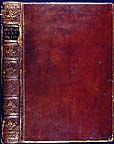

Ever since antiquity the Greek historian Herodotus (ca. 484Ð425 B.C.) has been called by some "the father of history" and by others "the father of lies." Although his History, recognized for its simple, flowing style and entertaining narrative, has been praised by ancient and modern alike, its trustworthiness has been questioned both in ancient and modern times. Several ancient writers accused Herodotus of intentional falsehood. Not until the sixteenth century did Herodotus recover from the verdicts passed on him.
The 1502 Aldine edition represents the first printing of Herodotus in the original Greek. During the age of exploration, when foreign diplomats, missionaries, and explorers wrote back to their native countries of faraway lands and strange customs, their accounts were extraordinarily reminiscent of Herodotus both in style and in method, especially reports from travelers and explorers concerning the discovery of America. These accounts vindicated Herodotus, because they showed that one could travel abroad, tell strange stories, and inquire into past events without necessarily being a liar. New exploration often revealed customs even more extraordinary than those described by Herodotus, and the latest reports were eagerly anticipated by the public.


 Exhibit Home Page
Exhibit Home Page  New World
Books
New World
Books